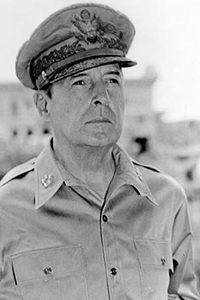Douglas MacArthur
What is true for Gen. Douglas MacArthur, that you either love him or hate him, isn’t true for any other great American military commander – or veteran.
George Washington is extolled as a leader who shaped a motley group of militiamen into a Continental Army, Ulysses S. Grant is admired for forcing Robert E. Lee’s surrender, John Pershing is renowned for his stubbornness, and George Marshall and Dwight Eisenhower are celebrated as the architects of victory in World War II. All of these, including Lee, are part of the pantheon of “great” American military leaders, entering our history nearly without blemish.
Celebrated for his record at West Point and one of the most decorated commanders of World War I, MacArthur is remembered for his July 1932 decision to wield federal troops against peaceful Bonus March demonstrators. The subsequent pictures of MacArthur’s troops beating hapless veterans forever stained his reputation. As did his April 1951 defiance of President Harry Truman, which led to his dismissal – and his reputation as an officer who defied civilian control.
But MacArthur was also a great military commander with a record of accomplishment nearly unequaled by any other World War II leader. His defense of the Philippines, conquest of New Guinea, reduction of the Japanese fortress at Rabaul, and victories at Leyte and Luzon propelled him into the front ranks of America’s greatest wartime strategists. His subsequent administration of postwar Japan, where he served as America’s “shogun,” sealed his, and America’s, legacy as conquerers without animus. And despite his disagreements with Truman, his landing at Inchon during the Korean War is credited with reversing a near defeat.
Vain, egotistical and self-promoting, MacArthur’s final act revealed his understanding of war and of the American people. “Never get involved in a land war in Asia,” he told John F. Kennedy in July 1961. Kennedy admired his advice and vowed to follow it, though sadly his successor didn’t.
Love him or hate him, Douglas MacArthur left his mark as a soldier, commander and veteran who refuses to fade away.
– Mark Perry, author of “The Most Dangerous Man In America: The Making of Douglas MacArthur”

